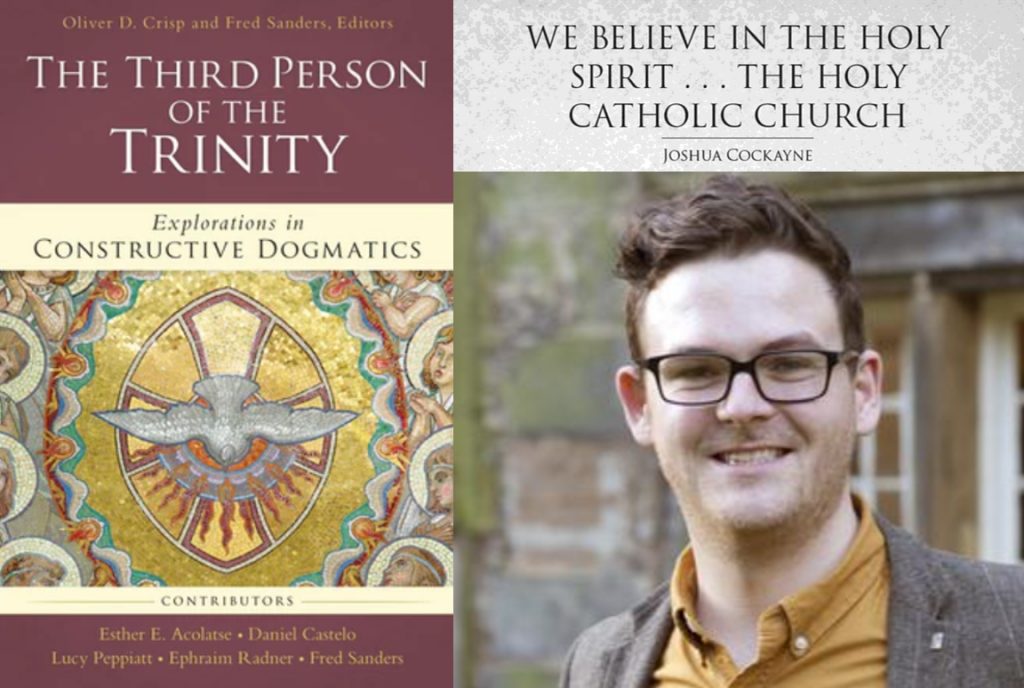
I’ve been asking the authors of chapters from our recent book The Third Person of the Trinity (Zondervan Academic, Dec. 2020) to explain a little bit about what’s in each of their chapters. By the time the book appears in print, the editors (Oliver Crisp and I, along with Katya Covrett at Zondervan) have had a history of interactions with each chapter: we saw them as proposals responding to our call for papers; we got to hear them in person at the Los Angeles Theology Conference, and we’ve worked on the final text. But inevitably if you ask the author where the chapter idea came from, there’s a longer history and wider network behind it.
Today I asked Dr. Joshua Cockayne for some details on his chapter. Here are his comments.
What’s your chapter in The Third Person of the Trinity about?
My chapter explores the relationship between pneumatology and ecclesiology. Typically these two doctrines go hand-in-hand; key to our understanding of the Church is understanding the role of the Spirit as the source of unity. My chapter explores this theme of unity in the Spirit by appealing to work in recent social metaphysics. To motivate such a project, I first consider Paul’s discussion of ecclesiology in 1 Corinthians in which the “one body of Christ” is united by the “one Spirt we were all baptised into.” As I show, Paul’s use of body imagery to explain the unity of the Church is heavily borrowed from political and philosophical texts of his time. By using well-known political metaphor, Paul is able to adapt and subvert certain well-known concepts in service of theology. I propose that recent philosophical work on group agency and social ontology can be pressed in service of the task of ecclesiology today, employing the work of functionalist group metaphysics to think about the unity the Church. This contemporary work has been used to explain how large organizations, such as corporations, can be held responsible for actions which seem to be attributable to no one individual. Unlike many organizational structures, however, the Church derives it agency not from the work of its organizational hierarchies but from the agency of the Holy Spirit who shapes and guides the actions of the members of the Church to participate in Christ’s body. I propose that we can adapt these recent metaphysical accounts to guide our thinking about the nature of the Church.
How does this chapter fit into your teaching or your writing?
I’m currently working on a much larger project, which seeks to offer an analytic approach to ecclesiology. This chapter forms part of the discussion of pneumatology and unity, from which I seek to offer an account of the sacraments and liturgy of the Church. I will be teaching some of this material next semester in the course: Persons: Human and Divine as part of the MLitt in Analytic and Exegetical Theology at St Andrews next semester.
Where did the idea for this particular essay come from?
I produced a paper on the ontology of the Church for the Journal of Analytic Theology, and I was dissatisfied that I hadn’t said enough about the role of the Holy Spirit in the Church. At the same, through some helpful conversations with colleagues in New Testament here at St. Andrews, I was made aware of some helpful literature on Paul’s use of socio-political thought in 1 Corinthians. The L.A. Theology conference seemed like an excellent context to expand some of my ideas in this area.
What’s the next thing you’re working on, or looking forward to working on?
As well as my book on analytic ecclesiology, I’m currently working on a few other projects. Along with Jonathan Rutledge, I am launching a new monograph series for Cascade, Wipf & Stock in analytic theology, and am excited to be working with the first few contributions to this series, including a book of my own on the epistemology of liturgy.
I am also currently co-authoring a book with Scott Harrower (Ridley Theological College) and Preston Hill (Richmont Graduate University) exploring how the Church can respond to trauma. This builds on some of the excellent work that Scott did in his book The God of All Comfort. With Harrower and Hill, as well as Chelle Sterns (Seattle School), we’re starting a new monograph series on trauma theology for Cascade.
A bonus question not related to this book chapter: What’s the most stimulating thing you’ve read lately in theology?
I’m currently in thick of writing the chapter on the Eucharist for my book and so much of my reading is related to this. I’ve had chance to revisit James Arcadi’s excellent book An Incarnation Model of the Eucharist, which is really superb and has been very formative for my own thinking. Arcadi employs work from the metaphysics of the incarnation to offer an account of the eucharist. His use of the metaphysics of extension to explain the relation between Christ’s body and the eucharistic elements has helped clarify my own account of the Church as the body of Christ. I’ve also been working through George Hunsinger’s The Eucharist and Ecumenism: Let us Keep the Feast, which is one of the best contemporary systematic discussions of the Eucharist I’ve engaged with.
For more sneak-peeks of The Third Person of the Trinity, check out our other interviews. You can pick up a copy of the book here.